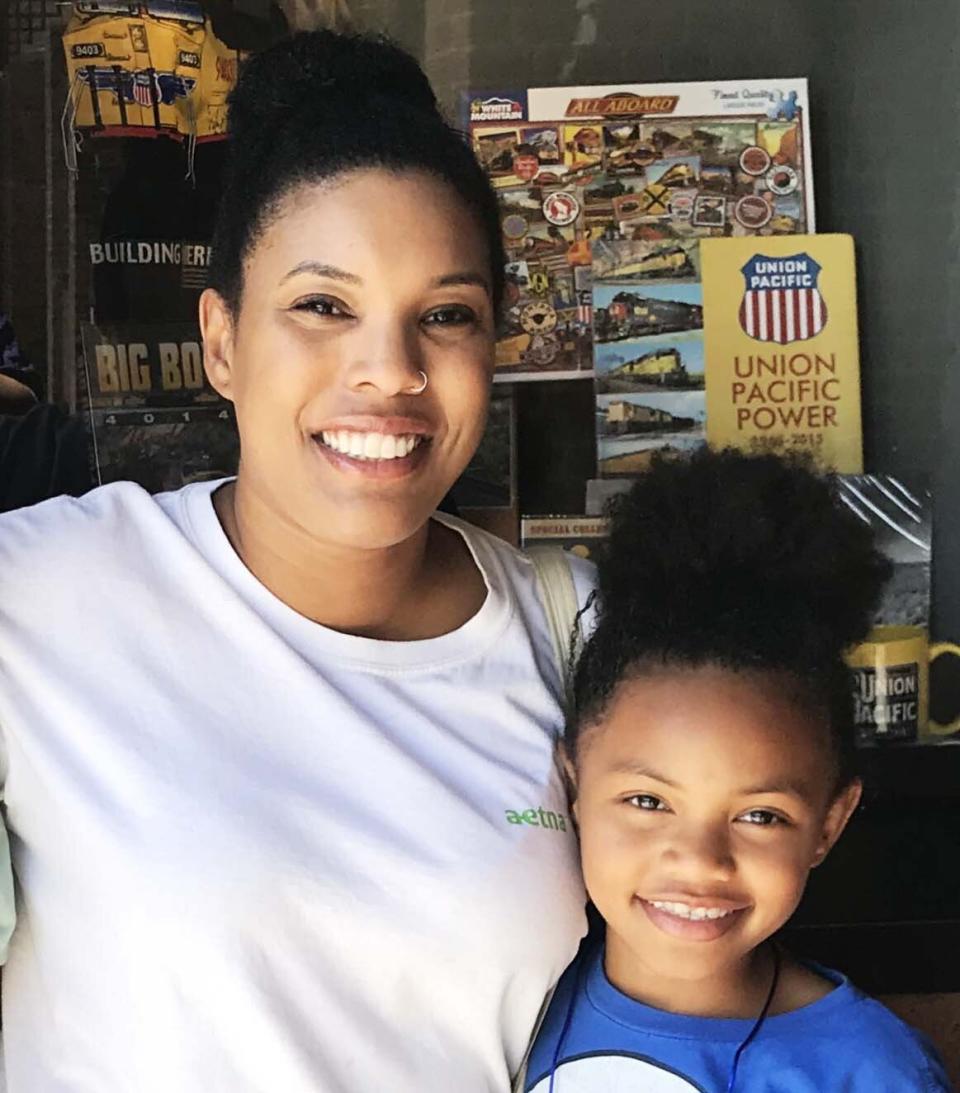The New School Suspension: Blocked From Online Classrooms
Audrey Taito, a rising fourth-grader in Sacramento, California, can’t say exactly what she did to get her school email account blocked in the spring. She’s only 9. Online learning was new to her, and she found the technology confusing. Her teacher and school principal say she bombarded the district’s tech support department with requests, but she doesn’t remember it like that. She thinks she might have sent too many messages to a friend in a private chatroom, triggering some sort of automatic spam response.
She does remember the shame and confusion she felt when her teacher wrote to her indicating that she was in trouble, and that she would hate to have to mute Audrey’s account. Later, her email account was blocked.
Audrey worried that she had been suspended from school, even while at home.
“I don’t want to go back to school because they embarrass me a lot,” Audrey, who attends elementary school in the Sacramento City Unified School District, said while snuggling up against her mother, Rashida Dunn-Nasr, a professional caregiver, and rubbing her face into a blanket. She and her mother spoke to HuffPost via Zoom.
The district blocked Audrey’s email account for only about two hours “after inappropriate emails were sent to our district IT staff from the account,” wrote spokesperson Tara Gallegos. Audrey could still participate in other online learning activities. However, email exchanges between Dunn-Nasr and the district show that she was never told when Audrey’s email privileges would be restored, and Audrey says she had difficulty submitting assignments for weeks after.
As many schools around the country plan to start remotely in the coming weeks, the incident is representative of how districts around the country are grappling with school discipline from afar. Some are dealing with incidents of misbehavior on a case-by-case basis, others are adding addendums to their typical codes of conduct that specifically address online learning, and some are planning to virtually replicate the consequences students have faced in the past. In Sacramento, students had to sign a contract governing rules for school computer use, though Audrey was using a personal device at the time, she said.
Advocates say they are worried schools will use exclusionary discipline practices at a time when children are already more likely to disconnect from their classroom and learning gains are fragile. The switch to remote learning is also happening at the same time many school districts, in the wake of protests against racist police violence, are analyzing how they punish students, particularly as it relates to the issue of school policing.
In emails, the principal of Audrey’s school wrote that she had tried to call Dunn-Nasr but that the call had gone to an already full mailbox. She then moved to suspend Audrey’s email account.
“When I could not reach you to discuss this concern, I ask that her email account be temporarily suspended until I had the opportunity to let you know what happened and how this behavior was draining our limited resources from students who needed the technical support the services are designed to give,” wrote the school principal in an email to Dunn-Nasr.
“I simply need her to understand that our Tech Support resources are valuable and limited. Every moment our Tech Support is dealing with an issue that should not have been sent to them in the first place, takes time away from students who are struggling with the many real technical problems that are present with the launch of Distant Learning,” the principal wrote in a subsequent message, provided to HuffPost.
The district says suspension of email accounts is standard practice when an account is generating suspicious activity ― a staff member even had their account briefly suspended.
But the whole incident made Audrey feel further disconnected from school at a time when she was already destabilized and receiving substantially less instruction than she otherwise would have.
“After that experience, Audrey was very upset, crying, very frightened that she had done something really awful,” Dunn-Nasr said. “She’s never ever gotten in trouble at any school.”

As districts consider discipline for students during remote learning, some are using the same processes they typically rely on in the classroom. Others say the moment calls for revising their rulebook.
Superintendent W. Burke Royster in Greenville, South Carolina, wrote in an email that his district’s schools will “replicate the consequences students have received in the past for various levels of discipline.”
“Administrative referral, conferences with parents, and the use of interventionists and social workers to try to re-direct or correct poor behavior will all be potential responses to on-going class management issues,” he wrote. More serious misbehaviors will result in “virtual suspensions,” referrals to an alternative education program, or in the worst of cases, expulsions.
Maureen Egbuna, director of the Department of Student Discipline, Prevention and Intervention in Georgia’s Clayton County Public Schools, said her district’s schools are newly incorporating social-emotional learning curriculum into classes to help students cope with the impact of COVID-19, in an effort to ultimately help prevent misconduct.
“We know that the best strategy for dealing with inappropriate behavior is to prevent those behaviors from happening in the first place,” Egbuna said, noting that most transgressions will result in outreach from a teacher, and then, if necessary, a support team to understand the root of whatever might be causing the misbehavior. “Everybody is going through some type of trauma,” she noted.
Only the most serious of transgressions, the ones that consistently disrupt instruction, will result in removing a child from a virtual classroom. In these cases, in-school or out-of-school suspensions may become necessary, she said, though they will look different than in years past.
During in-school suspensions, children will congregate in a virtual classroom with other students facing the same punishment. During out-of-school suspensions, children will likely have their own virtual classroom and be given a link with assignments to complete, Egbuna said.
The district has also set up a system allowing students to reach a school support team directly, in case they’re having issues at home or facing any other challenges that would prevent them from successfully attending school. The team is guaranteed to respond within 24 hours.
“We don’t want to lose any of them, particularly in this climate,” Egbuna said.

But of the many challenges school districts have had to consider as they manage reopening plans, whether it be virtual or in-person, school discipline may be far down on the list, worries Cami Anderson, founder of The Discipline Revolution Project, an initiative dedicated to helping schools find more positive approaches to punishment.
Anderson emphasizes that students are going to inevitably engage in more conflict this year, after months at home, living through the collective trauma of COVID-19. Black children in particular, who often disproportionately face harsh punishments in school, have also had to watch public incidents of lethal police violence play out.
“You’re going to have a lot more incidents and conflict and difficulty … yet the time that’s being spent to think that piece through doesn’t feel adequate,” Anderson said.
Anderson has already heard of several egregious examples of kids getting punished for appearing on Zoom without wearing their uniforms or for failing to properly submit their work online, but she’s also heard of kids acting willfully inappropriate on camera. She’s been working with partners to talk through each scenario and imagine ways to keep students learning, despite the challenges.
Schools are likely to continue the habits they made before the pandemic: If they were quick to punish students before, that’s only been heightened, while if they had support structures in place to help keep students in the classroom, that’s continued as well.
But amid a litany of unprecedented questions, she understands that school leaders are overwhelmed and drowning in challenges.
It’s a “lack of access to good information, confusion, struggle, not willful acts of not wanting to do the right thing. And frankly if it is, it’s our job to do everything humanly possible to connect with every family and get them instructional minutes by every means necessary,” she said.
In California at least, a group of school discipline attorneys recently wrote to the governor asking him to take actions that would stop schools from expelling students during the pandemic and that all expulsion referrals from pre-coronavirus times be rescinded. However, without a groundswell of support, the effort faltered, said Oscar Lopez, interim director of the education advocacy clinic at East Bay Community Law Center.
“It would be great if during the fall period the practice of excluding students from Zoom classrooms is prohibited,” Lopez said.
The punishment Audrey faced has had a lasting impact on her view of school. She doesn’t want to sign back on in the fall. Her mother is considering home schooling her for the time being after this incident and others involving Audrey’s siblings made her lose trust in the district.
“I don’t know why they suspended me. I didn’t even know I was sending support tickets. I don’t even know what happened,” Audrey said, burying her head against her mother.
A HuffPost Guide To Coronavirus
Stay up to date with our live blog as we cover the COVID-19 pandemic
7 essential pieces of relationship advice for couples in quarantine
What you need to know about face masks right now
How to tell if you need to start doing online therapy
Lost your job due to coronavirus? Here’s what you need to know.
Parenting during the coronavirus crisis?
What coronavirus questions are on your mind right now? We want to help you find answers.
Everyone deserves accurate information about COVID-19. Support journalism without a paywall — and keep it free for everyone — by becoming a HuffPost member today.
Love HuffPost? Become a founding member of HuffPost Plus today.
This article originally appeared on HuffPost and has been updated.

 Yahoo News
Yahoo News 